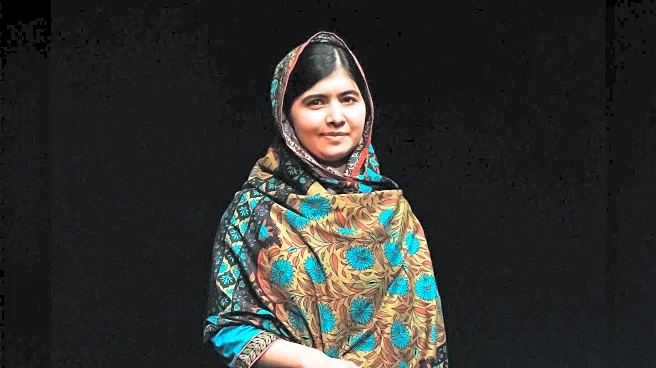What's Happening?
Malala Yousafzai, Nobel Peace Prize laureate, is sharing her personal journey in her new memoir, 'Finding My Way.' In an interview, Yousafzai expressed her desire for readers to see her as more than just
an activist. Her memoir delves into her experiences with mental health, friendships, marriage, and activism. Yousafzai first gained global attention in 2012 when she was shot by the Taliban for advocating girls' education in Pakistan. After surviving the attack, she moved to the UK for treatment and later attended Oxford University. Her memoir highlights her struggles with panic and anxiety attacks, and the importance of therapy in her recovery. Yousafzai also discusses finding love and overcoming fears of marriage, having married Asser Malik in 2021.
Why It's Important?
Malala Yousafzai's memoir offers a deeper understanding of her personal growth beyond her public persona as an activist. Her candid discussion about mental health and therapy underscores the importance of addressing psychological recovery alongside physical healing, especially for survivors of violence. This narrative can inspire others facing similar challenges to seek help and prioritize mental well-being. Additionally, her story of finding love and overcoming cultural fears of marriage provides a relatable perspective on personal relationships. Yousafzai's experiences highlight the complexities of adapting to new cultures and the significance of friendship and support networks in personal development.
What's Next?
Yousafzai's memoir may influence public discourse on mental health, particularly in the context of trauma recovery. Her advocacy for therapy could encourage educational institutions and policymakers to prioritize mental health resources for students. As Yousafzai continues to share her story, she may engage in further discussions and interviews, potentially impacting societal attitudes towards mental health and marriage. Her ongoing activism and personal insights could lead to collaborations with mental health organizations and initiatives aimed at supporting survivors of violence.
Beyond the Headlines
The memoir's exploration of cultural barriers and personal growth in a foreign country highlights broader themes of identity and belonging. Yousafzai's journey reflects the challenges faced by immigrants and refugees in adapting to new environments. Her experiences may resonate with individuals navigating cultural transitions, emphasizing the importance of inclusivity and support systems. Furthermore, her story challenges stereotypes about marriage and relationships, advocating for partnerships based on mutual respect and shared values.











